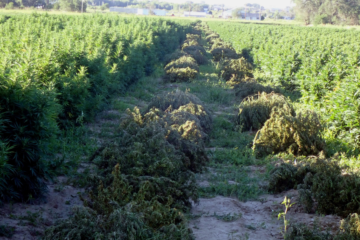California’s Supreme Court just handed the cannabis industry a win, stepping in to reverse a lower court decision that threatened to let federal law override state protections for marijuana businesses.
This wasn’t about big headlines or high-profile raids — it started with a property dispute. But the implications? Much bigger. The ruling ensures that legal weed operators can continue using easements — legal rights to pass through another’s land — to move cannabis, without being blocked by arguments citing federal prohibition.
A local property fight with statewide consequences
It all kicked off in Santa Barbara County.
A property owner there filed a lawsuit saying they didn’t want marijuana transported across an easement on their land. Their reasoning? Since cannabis is still banned at the federal level, any state-level approval for that transport shouldn’t count.
In January, a state appellate court actually agreed. They ruled that federal law — which still classifies marijuana as a Schedule I drug — superseded California’s. That meant the cannabis businesses couldn’t use the easement.
One sentence was all it took to rattle the industry.
It wasn’t just about one easement anymore. If that ruling held, it could’ve set a precedent letting landowners across the state block cannabis businesses from moving goods — even if those businesses were operating completely legally under California law.

Supreme Court steps in and reverses course
On Thursday, the California Supreme Court reversed the appellate court’s decision.
This wasn’t some technical correction. This was a strong, clear message: federal prohibition doesn’t automatically strip away rights granted under state law.
Nicole Elliott, director of California’s Department of Cannabis Control, welcomed the news. “We are pleased the Court agreed to address that Court of Appeal decision… supporting California law and its legal cannabis industry,” she said.
That one sentence likely brought a sigh of relief to hundreds of legal operators across the state.
California’s cannabis program is one of the largest and most complex in the world. A ruling like the one from January could’ve disrupted supply chains, licensing frameworks, and — ultimately — product availability.
Why this matters beyond just one road or one county
This wasn’t about trucks rolling through a dusty backroad in Santa Barbara. It was about whether California’s legalization can function in a world where federal laws haven’t caught up.
California has always had to play a balancing act with federal law. But the courts have largely respected the state’s right to legalise, regulate, and run its own market — within its own borders.
Here’s what the Supreme Court decision essentially reaffirmed:
- Federal law doesn’t automatically cancel out state cannabis laws.
- Property rights in California can’t be selectively enforced to stop legal cannabis activity.
- Local disputes can’t be used to build a backdoor argument against state-legal cannabis operations.
It’s not just theory. According to data from the California Department of Tax and Fee Administration, legal cannabis sales generated more than $5.3 billion in taxable revenue in 2023. Disrupting distribution could’ve meant chaos — both economic and logistical.
Legal cannabis is still walking a tightrope
Even with this win, California’s marijuana market isn’t free from risk.
The disconnect between state and federal law creates a shaky foundation. Banks won’t touch cannabis companies. Interstate commerce remains blocked. And in legal disputes like this, federal law can still be pulled out as a weapon.
This case just proves it.
At its core, the lawsuit was about whether transporting cannabis across someone else’s land counted as a crime — not in California’s eyes, but under U.S. law.
And the appellate court’s initial ruling showed that even lower-level judges might be willing to take a federal angle to override state protections. That made industry insiders nervous.
One legal expert, speaking off the record, said it plainly: “It was a sleeper threat. If that appellate ruling held, it would’ve created a whole new set of headaches.”
What happens next for cannabis operators
With the Supreme Court’s reversal, cannabis businesses can breathe — for now. They can keep moving products through easements, as long as they’re doing it under California’s legal framework.
But there’s still the bigger question of long-term federal reform. Without it, the industry is vulnerable.
Here’s a quick look at what’s currently legal and illegal:
| Activity | Legal in CA | Legal Federally |
|---|---|---|
| Cultivating cannabis (licensed) | Yes | No |
| Selling cannabis within California | Yes | No |
| Transporting cannabis in-state | Yes | No |
| Using easements for cannabis transport | Yes (now) | No |
| Banking and financial services | Limited | No |
That last row? Still a major sticking point. Without federal reform, banks and insurers continue to treat cannabis companies like a legal risk — even in states where it’s fully allowed.
A quiet but major legal shift in the cannabis fight
This wasn’t a blockbuster ruling. It didn’t make front pages. No flashy quotes or protests on courthouse steps.
But this is how the cannabis legal landscape changes — one property dispute at a time.
For now, California’s legal weed businesses can keep their wheels turning. The road ahead’s still bumpy, but at least this pothole’s been filled.



